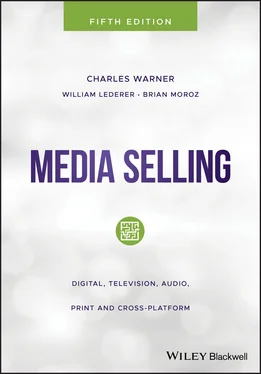The Current Model: Selling as Educating
The vast majority of buyers and customers of the media are hypersensitive to the tricks, manipulations, and the selling of “magic” in the past. With the highly complex digital advertising ecosystem, programmatic trading, and the explosion of available data, buyers need relationships with media salespeople based on a basic understanding of the underlying ad‐delivery technology, familiarity with available data, and mutual trust. Establishing mutual trust is the first step for a successful digital‐era, selling‐as‐educating model which, in turn, requires salespeople to have emotional intelligence in order to develop trusting relationships.
The Importance of Emotional Intelligence
The term emotional intelligence was popularized by Daniel Goleman, a Harvard‐educated PhD in psychology, in his best seller, Emotional Intelligence: Why It Can Matter More Than IQ , which expanded on the work of the world‐renowned educational psychologists, Howard Gardner, Robert Sternberg and others.
Gardner, Sternberg, and others questioned accepted definitions of intelligence and began to look beyond a number or intelligence quotient (IQ). After exploring the topic thoroughly, they realized that what IQ tests measured was only a person’s ability to take an IQ test and was not the enormously complex construct that had been referred to in the past as “intelligence.”
While Howard Gardner broadly defined intelligence as “the ability to solve problems or to create products that are valued within one or more cultural settings,” in his influential book, Frames of Mind, The Theory of Multiple Intelligences , he identified seven facets of intelligence. These are linguistic, logical‐mathematical, musical, bodily‐kinesthetic, spatial, interpersonal, and intrapersonal. In his book, Intelligence Reframed: Multiple Intelligences for the 21st Century , he added three more facets of intelligence: naturalist, spiritual, and existential.
Daniel Goleman concentrated his research on the importance of the personal intelligences, which he labeled emotional intelligence . Beginning in Emotional Intelligence , published in 1995, and in three subsequent books, Working With Emotional Intelligence , Primal Leadership: Realizing the Power of Emotional Intelligence , and Social Intelligence Goleman has continued to refine and simplify his construct of emotional intelligence (referred to as EQ, emotional quotient) and social intelligence. In Working With Emotional Intelligence , Goleman defined emotional intelligence as the “capacity for recognizing our own feelings and those of others, for motivating ourselves, and for managing emotions well in ourselves and in our relationships.” 1 His book, Primal Leadership , lays out an expanded definition that includes four dimensions of EQ, as defined in Exhibit 5.1below:
Exhibit 5.1Emotional intelligence domains and associated competencies
| Personal competence: These capabilities determine how we manage ourselves. Self‐awareness Emotional self‐awareness: Reading one’s own emotions and recognizing their impact; using “gut sense” to guide decisions.Accurate self‐assessment: Knowing one’s strengths and limits.Self‐confidence: A sound sense of one’s self‐worth and capabilities. Self‐management Emotional self‐control: Keeping disruptive emotions and impulses under control.Transparency: Displaying honesty and integrity; trustworthiness.Adaptability: Flexibility in adapting to changing situations or overcoming obstacles.Achievement: The drive to improve performance to meet inner standards of excellence.Initiative: Readiness to act and seize opportunity.Optimism: Seeing the upside in events. Social competence: These capabilities determine how we manage relationships. Social awareness Empathy: Sensing others’ emotions, understanding their perspective, and taking an active interest in their concerns.Organizational awareness: Reading the currents, decision networks, and politics at the organizational level.Service: Recognizing and meeting…client or customer needs. Relationship management Inspirational leadership: Guiding and motivating with a compelling vision (for media salespeople this would translate into creating value with an inspiring vision for your medium and your media outlet).Influence: Wielding a range of tactics of persuasion.Developing others: Bolstering others’ ability through feedback and guidance.Change catalyst: Initiating, managing, and leading a new direction.Conflict management: Resolving disagreements.Teamwork and collaboration: Cooperation and team building. |
Source: Goleman, Daniel, Boyatzis, Richard, and McKee, Annie. 2002. Primal Leadership: Realizing the Power of Emotional Intelligence . Boston, MA: Harvard Business School Press. Used with permission.
How important is emotional intelligence in selling?
Goleman makes the case that, contrary to previously held theories, IQ might not be an accurate predictor of life success. “At best IQ contributes about 20 percent to the factors that determine life success, which leaves 80 percent to other forces. As one observer notes, ‘The vast majority of one’s ultimate niche in society is determined by non‐IQ factors, ranging from social class to luck.’” 2 A study of Harvard graduates in the fields of law, medicine, teaching, and business found that scores on entrance exams, a surrogate for IQ, had zero or negative correlation with eventual career success.
A study initiated in 1968 by the Stanford Graduate School of Business reinforced the importance of emotional intelligence for success in business. It conducted in‐depth interviews with the members of its graduating class, which examined the students’ academic records and grades, their extracurricular and social activities, and their reputation among their fellow students. The school kept track of the graduates’ careers and levels of success with re‐interviews in 1978 and in 1988. When the school published the findings of its 20‐year study in 1988, it concluded that the only two things that the most successful graduates (top five percent in title, position, money, for example) had in common was that all of the most successful graduates were in the bottom half of their class in grades and all of them were popular. In other words, relationship skills were more important for success than grades.
A major element of and success is optimism. A study of salesmen at Met Life by Martin Seligman revealed that,
Being able to take a rejection with grace is essential in sales of all kinds, especially with a product like insurance, where the ratio of nos to yeses can be so discouragingly high. For this reason, about three quarters of insurance salesmen quit in their first three years. Seligman found that new salesmen who were by nature optimists sold 37 percent more insurance in their first two years on the job than did pessimists. And during the first year the pessimists quit at twice the rate of the optimists.” 3
Media salespeople sell an intangible product similar to what insurance salespeople sell, but media salespeople do not have quite the same rejection rate, which makes media selling more desirable and satisfying. However, the above research reinforces the importance of optimism in selling. Optimism is defined in terms of how people explain to themselves their own successes and failures. People who are optimistic believe failures are the result of something that can be changed so that they can be successful the next time around. Pessimists take personal blame for failures, attributing them to some inherent characteristic they are helpless to change. 4 Pessimists also often blame their parents or their bosses or even the weather for their failures. Their attitude is that they expect failure; therefore, they create failures and a disastrous future. On the other hand, optimists expect success, and therefore create a successful future. Seligman’s research reinforces the importance of attitude in selling.
Читать дальше












